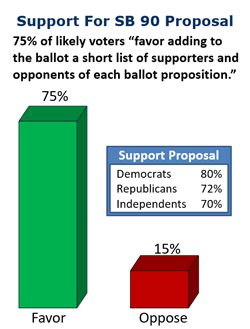About SB 52, California DISCLOSE Act
Change the Big Money Game with True Transparency
SB 52, the California DISCLOSE Act, would have let voters know who REALLY is paying for all those ballot measure ads — on the ads themselves. Authored by Senators Mark Leno and Jerry Hill and sponsored by the California Clean Money Campaign, SB 52 would have amended the Political Reform Act of 1974 and therefore required a two-thirds vote of the legislature to pass. It followed-up to AB 1648, which made history by passing the Assembly in August 2012 before running out of time to pass the Senate.
SB 52 passed the Senate on an overwhelming and bipartisan vote of 28-11 and then passed the Assembly Elections and Appropriations Committees, but did not get an Assembly floor vote. Opposition from California organized labor leaders made passage of the DISCLOSE Act this session with a 2/3 vote extremely unlikely and even called into question its ability to get a vote at all.
Read our statement here.
We are currently working on new language for a new bill that will still require ballot measure ads to clearly and prominently reveal their true, original funders, while addressing stakeholders' concerns with SB 52's mechanism for doing so.
California DISCLOSE Act Provisions
- Requires the three largest funders of ballot measure ads to be clearly identified (two largest for radio ads and robocalls), so voters know who is actually paying for them.
- Applies to all television ads, radio ads, print ads, mass mailers, online ads, and billboards for or against state and local ballot measures. It applies whether ads are paid for by corporations, unions, or millionaires.
- Tells voters where to find the details for the largest committees — Requires ads paid for by committees that spend $1 million or more to link to the FPPC page listing their top ten funders.
- Follow-the-Money Disclosure will ensure that the names shown on ads are the "original source of contributions... notwithstanding the fact that the contributions were transferred, in whole or in part, through one or more other committees or persons". In other words, they most show the actual original corporate, union, or individual contributors — not misleading committee and non-profit names.
Print Provisions Overview or Official SB 52 Language

Disclosure of Big Spenders Works
- The attempt by Texas oil interests to overturn California's landmark climate change law with Prop 23 in 2010 failed because opponents had enough funds to disclose to voters that it was funded by Texas oil companies.
- Despite tens of millions spent in 2010 on Props 16 and 17 by PG&E and Mercury Insurance, both lost because enough people knew they were the largest spenders and took that into account when viewing their ads.
Unfortunately, the largest funders aren't usually as clear as in Props 16, 17, and 23. SB 52 would make sure they're clear all the time.
SB 52 is Constitutional and Reasonable
- 8 out of 9 justices in the Supreme Court's Citizens United decision noted the problems when groups run ads "while hiding behind dubious and misleading names" and said we need transparent disclosure for voters "to make informed decisions and give proper weight to different speakers and messages."
- Required TV ad disclosures are the same time and space as current law — just much more effective.
- Required radio ad disclosures are shorter than those in current law in most cases — but more effective.
- "The California DISCLOSE Act, SB 52, stands on a firm constitutional bedrock and is worthy of support."
— Brennan Center for Justice, 4/24/2013
See our
full comparison to current disclosure law to see how SB 52 is both reasonable and effective.
"Requiring people to stand up in public for their political acts fosters civic courage, without which democracy is doomed."
— Justice Antonin Scalia, writing in Doe v. Reed, 2010
Californians are Ready for the California DISCLOSE Act
- 84% of California voters said they favored legislation to "increase the public disclosure requirements of initiative sponsors to more clearly identify who are its major funders" in the October 13, 2011 Field Poll, including 86% of Democrats, 88% of Independents, and 78% of Republicans.
- Over 100,000 Californians have signed petitions urging the legislature to pass the California DISCLOSE Act.
"The overwhelming power of money to mislead voters is a profound moral issue."
— Reverend Dr. Rick Schlosser, Executive Director of
California Church IMPACT, representing 1.5 million people of faith in California.
Tell voters who is really funding propositions and attack ads when it counts!
 Before and After Examples
Before and After Examples








